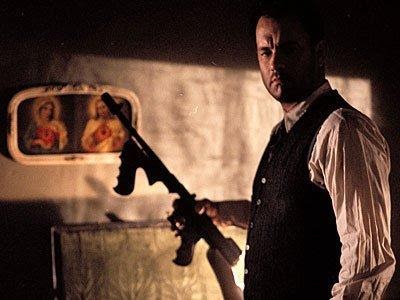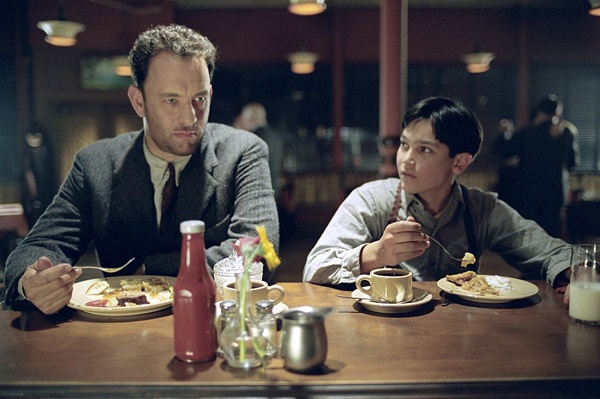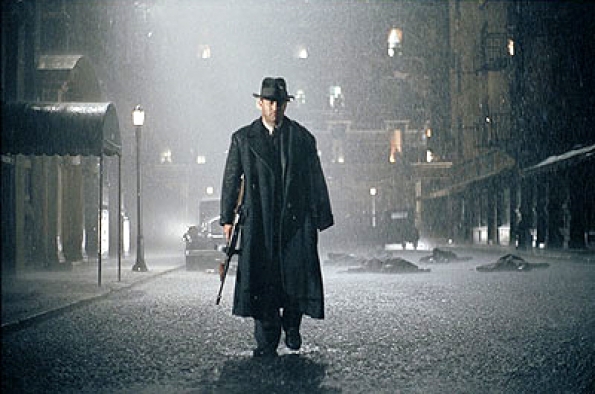Road to Perdition (2002)
CAST: Tom Hanks, Paul Newman, Jude Law, Tyler Hoechlin, Daniel Craig, Stanley Tucci, Jennifer Jason Leigh, Dylan Baker, Ciaran Hinds, Liam Aiken
REVIEW:
An adaptation of a graphic novel by Max Allan Collins and illustrated by Richard Piers Rayner, and produced by such illustrious names as Dean Zanuck, Richard D. Zanuck, and Steven Spielberg, Road to Perdition marked Sam Mendes’ eagerly-anticipated next project following his Oscar-winning American Beauty. It’s a venture into the gangster genre, but what it’s really about at its core is the relationships between fathers and sons. The result is visually splendorous and technically accomplished but a little emotionally remote, and viewers wanting a more action-packed gangster yarn may be bored by the deliberate, unhurried pace. Nonetheless, for fans of the gangster genre, Road to Perdition is a sumptuous and handsomely-crafted entry.
We open in 1931 somewhere outside of Chicago. Michael Sullivan (newcomer Tyler Hoechlin) is the eldest son of his same-named father (Tom Hanks), one of the chief enforcers and most trusted henchmen for local Irish mob boss John Rooney (Paul Newman). In fact, so close is Sullivan and Rooney’s pseudo-familial relationship that Rooney’s loose cannon biological son Connor (Daniel Craig) simmers with jealousy on the sidelines. One night, the curious boy hides in his father’s car while he goes out on a job. Predictably, young Michael sees something he shouldn’t have, which the twitchy Connor uses as an excuse to take out the Sullivan clan, murdering Sullivan’s wife (Jennifer Jason Leigh) and youngest son (Liam Aiken), but missing Michael (who’s not home) and failing in his attempt to set up the patriarch’s demise. Unwilling to be paid off to forego his revenge and disappear by the elder Rooney, Sullivan, with Michael in tow, sets out to seek vengeance on Connor, forcing Rooney’s hand to reluctantly dispatch another hitman, Maguire (Jude Law), to eliminate Sullivan.
The strongest aspect of Road to Perdition is in its visual splendor. In some ways, late veteran cinematographer Conrad L. Hall (who passed away shortly after working on the film, which is dedicated to him), is as much a behind-the-scenes “star” as any of the actors. The recreation of 1930s Chicago is sumptuous and picturesque, albeit admittedly glossy and romanticized. 1930s gangland Chicago’s overlord Al Capone remains offscreen, although Anthony LaPaglia filmed a cameo as Capone that ended up a deleted scene (having viewed the deleted scene, it being deleted was for the best; LaPaglia’s portrayal is cartoonish and feels out-of-place with the movie). Hall makes much use of rain and lighting to enhance the somber, melancholy ambiance. Light shines through a rain-swept window and makes the whole room look as if it’s weeping. There are repeated shots of characters cutting striking silhouettes in downpours, the water dripping picturesquely off the brims of their fedoras and soaking their thick wool overcoats. The desaturated color tones and visceral chill (Hall said he would have liked to have filmed it in black-and-white) gradually warm into brighter (albeit still subdued) colors as the season changes from winter to spring (by Hall and Mendes’ account, serving as symbolic visual representation of the thawing and warming relationship between the senior and junior Michael Sullivans). One could accuse Road to Perdition of being “Oscar bait”, and at least one sequence—a silent shootout in the rain—is filmed in self-consciously artsy and pretentious fashion, but the movie is always gorgeous to look at, and those who appreciate the 1930s gangster movie trappings of period cars, fedoras and long coats, Tommy guns, etc., will find no shortage of eye candy to feast upon.
 The movie is slightly less absorbing when it comes to character and plot. The narrative is solid and engaging, but simple and straightforward, with no major twists and turns to be found, and moves slowly and inexorably toward its destination with the grim solemnity of a Greek tragedy (apart from an interlude with Michael learning to drive to serve as Dad’s getaway driver, there’s precious little “comic relief”). This is not an action movie, but a somber, stately, serious drama which refuses to rush itself and unspools at its own pace and in its own way, with the leisurely pace only intermittently broken with a brief burst of action. Religious symbolism is heavy; like all self-respecting movie mobsters, Rooney and Sullivan are practicing Catholics, and we get shots of Sullivan setting down first his rosary, then his gun, after a day’s work, and a shot of Sullivan assembling his Tommy gun framed against the backdrop of framed portraits of Christ and Mary (also, the “Perdition” in the title has a less-than-subtle double meaning). The characters and their relationships are deeply conflicted, but the movie’s tone keeps us at a bit of an emotional distance. At its core, it’s about the relationships between fathers and sons, both biological (Mike Sr./Michael and John/Connor) and surrogate (Mike/John). Rooney makes the agonizing decision to throw Sullivan under the bus to save Connor, even though he wishes Sullivan were his son instead. And the central Sullivan relationship (or lack thereof) is one of distance and mystery (young Michael naively imagines his father is some heroic secret agent until curiosity leads him to stumble across the less savory truth). Sullivan is in a state of trying to keep his unsavory job separate from his life as a wholesome family man, especially for Michael’s sake, whom he fears is too much like him, and doesn’t want to see following in his footsteps. “This is the life we chose, the life the lead,” Rooney tells Sullivan at one point, “There is only one guarantee: none of us will see Heaven”. “Michael could,” Sullivan replies. Rooney then insists that it is Sullivan’s duty to make sure that happens.
The movie is slightly less absorbing when it comes to character and plot. The narrative is solid and engaging, but simple and straightforward, with no major twists and turns to be found, and moves slowly and inexorably toward its destination with the grim solemnity of a Greek tragedy (apart from an interlude with Michael learning to drive to serve as Dad’s getaway driver, there’s precious little “comic relief”). This is not an action movie, but a somber, stately, serious drama which refuses to rush itself and unspools at its own pace and in its own way, with the leisurely pace only intermittently broken with a brief burst of action. Religious symbolism is heavy; like all self-respecting movie mobsters, Rooney and Sullivan are practicing Catholics, and we get shots of Sullivan setting down first his rosary, then his gun, after a day’s work, and a shot of Sullivan assembling his Tommy gun framed against the backdrop of framed portraits of Christ and Mary (also, the “Perdition” in the title has a less-than-subtle double meaning). The characters and their relationships are deeply conflicted, but the movie’s tone keeps us at a bit of an emotional distance. At its core, it’s about the relationships between fathers and sons, both biological (Mike Sr./Michael and John/Connor) and surrogate (Mike/John). Rooney makes the agonizing decision to throw Sullivan under the bus to save Connor, even though he wishes Sullivan were his son instead. And the central Sullivan relationship (or lack thereof) is one of distance and mystery (young Michael naively imagines his father is some heroic secret agent until curiosity leads him to stumble across the less savory truth). Sullivan is in a state of trying to keep his unsavory job separate from his life as a wholesome family man, especially for Michael’s sake, whom he fears is too much like him, and doesn’t want to see following in his footsteps. “This is the life we chose, the life the lead,” Rooney tells Sullivan at one point, “There is only one guarantee: none of us will see Heaven”. “Michael could,” Sullivan replies. Rooney then insists that it is Sullivan’s duty to make sure that happens.
The idea of Tom Hanks as a mob enforcer/hitman might have struck some as a dubious prospect, but the concern is unwarranted. Hanks, his natural affability muted, looking grim and melancholy and bulky under heavy overcoats and fedoras, isn’t the most intimidating hitman we’ve ever seen (though nor is he really trying to be), but it’s not hard to take him seriously in the part, although for those wondering how Hanks fares in his first “villainous” role, we’ll have to keep waiting to see if he ever tackles a flat-out villain, because this isn’t it. Sullivan is portrayed sympathetically as a flawed man, not as a villain, a man who has no illusions about his dirty job but carries it out stoically and dutifully, and over whom a sense of melancholy hangs like a cloud. In an attempt to shield his son from his job, he has kept him at a distance to the point where he barely knows him and is a mysterious, vaguely ominous figure. The reliability of Hanks’ screen presence is matched by that of Paul Newman, who seems at home in the role of an elder mob boss whose twinkly-eyed grandfatherly demeanor can belie a stern pragmatism. Like Sullivan, Rooney adheres to a certain sense of honor; he tries to avoid unnecessary bloodshed, he loves Sullivan and his children, he refuses the suggestions of subordinates to use his connections to take advantage of union workers (“it’s what men do after work that’s made us rich, no need to screw them while they’re at work as well”), but when push comes to shove, he will put Connor’s life ahead of anyone else’s, even Sullivan’s, despite harboring no illusions about what his son is.
 Jude Law is third-billed, but that has more to do with name recognition than the size of his part. Law doesn’t appear until almost an hour into the movie, and then only pops up in a few scenes scattered around. Unlike Sullivan, who’s portrayed about as upstanding as a mob enforcer can be, Law’s Maguire is a creepy weirdo who specializes in crime scene photographs (some of his own making) and moonlights as a hitman. Law puts some character actorly detail into the part (he downplays his looks behind a balding head, yellow teeth, and long fingernails, and adopts a strange shuffling walk), but his character development is limited to a morbid fascination with photographing corpses. Of the other supporting cast, Daniel Craig is suitably slimy, and small roles are filled out with Stanley Tucci (as Capone’s all-business right-hand man Frank Nitti), Dylan Baker (as a fussy and effeminate mob accountant), and Ciaran Hinds (as a Rooney associate whose death helps set the chain of events in motion), reliable character actors who aren’t stars but who bring touches of distinction to what could have been throwaway bit parts. Film newcomer Tyler Hoechlin, chosen from among 2,000 contenders, is convincing as a boy whose view of his father runs a gamut of shifting and conflicted emotions over the course of the film, In many ways, Michael is really the main character of the story, and the most sympathetic.
Jude Law is third-billed, but that has more to do with name recognition than the size of his part. Law doesn’t appear until almost an hour into the movie, and then only pops up in a few scenes scattered around. Unlike Sullivan, who’s portrayed about as upstanding as a mob enforcer can be, Law’s Maguire is a creepy weirdo who specializes in crime scene photographs (some of his own making) and moonlights as a hitman. Law puts some character actorly detail into the part (he downplays his looks behind a balding head, yellow teeth, and long fingernails, and adopts a strange shuffling walk), but his character development is limited to a morbid fascination with photographing corpses. Of the other supporting cast, Daniel Craig is suitably slimy, and small roles are filled out with Stanley Tucci (as Capone’s all-business right-hand man Frank Nitti), Dylan Baker (as a fussy and effeminate mob accountant), and Ciaran Hinds (as a Rooney associate whose death helps set the chain of events in motion), reliable character actors who aren’t stars but who bring touches of distinction to what could have been throwaway bit parts. Film newcomer Tyler Hoechlin, chosen from among 2,000 contenders, is convincing as a boy whose view of his father runs a gamut of shifting and conflicted emotions over the course of the film, In many ways, Michael is really the main character of the story, and the most sympathetic.
Like most gangland epics, Road to Perdition deals with themes of family (figurative and literal), loyalty, and betrayal, not as deeply or powerfully as The Godfather but in sure-handed, absorbing fashion in the hands of a solid cast and an assured director. It is neither action-packed nor light-hearted, but for those in search of a serious gangster genre, many will find that the Road to Perdition is worth traveling.
* * *
